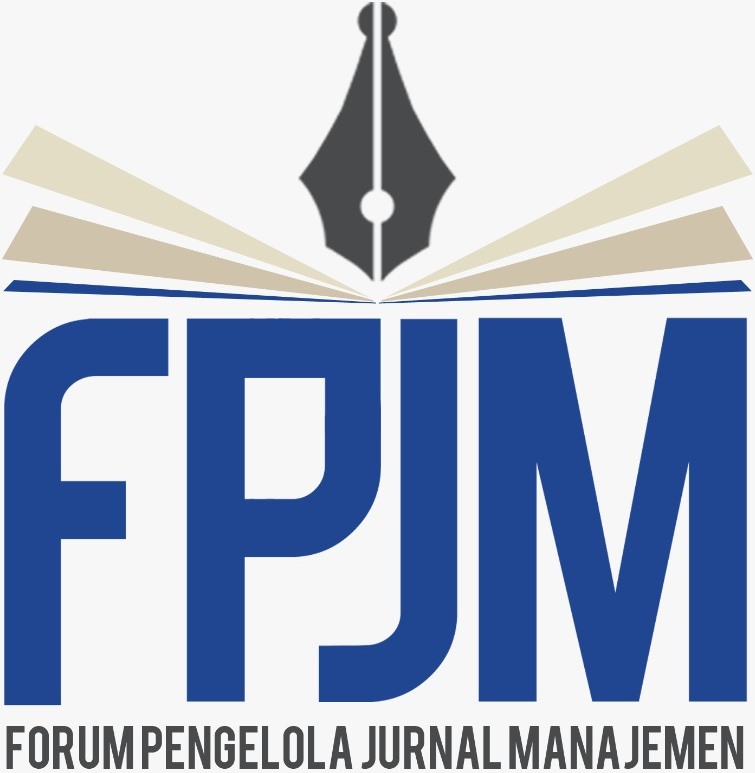FINANCIAL LITERACY AND ITS IMPACT ON LOAN PERFORMANCE: SOME EVIDENCE FROM SAVING AND LOAN COOPERATIVES IN INDONESIA
Abstract
ABSTRACT
The objective of this study is to examine whether the savings and loan cooperative (SLC), through financial literacy, to increase loan performance quality and the business capacity of members as institutional owners. The research sample was selected using questionnaires with five Likert scales. Research population and sample take location in five Java provinces in Indonesia, which represent 150 SLC or 15 percent of the total provinces in Indonesia. The research method was quantitative, and the analysis technique used SEM PLS. The results of this study indicate that saving and loan cooperative management innovations through the provision of business assistance, marketing consulting, and financial literacy affect the credit performance of their institution. Research findings can play a pivotal role of microfinance institutions (MFIs to support members' businesses and strengthen literacy through institutional regulations. This research can assist microfinance institution management to strengthen the organization's strategic role in financial intermediation and empower micro and small entrepreneurs as members in line with the dual economic and social mission.
ABSTRAK
Tujuan dari penelitian ini adalah untuk mengkaji apakah koperasi simpan pinjam (KSP) melalui literasi keuangan dapat meningkatkan kualitas kinerja pinjaman dan kapasitas usaha anggota sebagai pemilik institusi. Sampel penelitian dipilih menggunakan kuesioner dengan skala Likert lima poin. Populasi dan sampel penelitian berlokasi di lima provinsi di Jawa, Indonesia, yang mewakili 150 KSP atau 15 persen dari total provinsi di Indonesia. Metode penelitian yang digunakan adalah kuantitatif dan teknik analisisnya menggunakan SEM PLS. Hasil penelitian ini menunjukkan bahwa inovasi manajemen koperasi simpan pinjam melalui penyediaan bantuan usaha, konsultasi pemasaran, dan literasi keuangan memengaruhi kinerja kredit institusi mereka. Temuan penelitian ini dapat memainkan peran penting bagi lembaga keuangan mikro (LKM) untuk mendukung usaha anggota dan memperkuat literasi sesuai dengan peraturan institusi. Penelitian ini dapat membantu manajemen lembaga keuangan mikro untuk memperkuat peran strategis organisasi dalam intermediasi keuangan dan pemberdayaan pengusaha mikro dan kecil sebagai anggota, sejalan dengan misi ganda ekonomi dan sosial.
Keywords
References
Behr, P., & Sonnekalb, S. (2020). The effect of information sharing between lenders on access to credit, cost of credit, and loan performance-evidence from a credit registry introduction. Journal of Banking and Finance, 36(11), 3017–3032. https://doi.org/10.1016/j.jbankfin.2020.07.007.
Birkinshaw, J., Hamel, G., & Mol, M. J. (2020). Management innovation. Academy of Management Review, 33(4). https://doi.org/10.5465/amr.2008.34421969.
Fianto, B. A., Maulida, H., & Laila, N. (2019). Determining factors of non-performing financing in Islamic microfinance institutions. Heliyon, 5(8), 1-5. https://doi.org/10.1016/j.heliyon.2019.e02301.
Fornell, C., & Larcker, D. F. (2020). Evaluating structural equation models with unobservable variables and measurement error. Journal of Marketing Research, 18(1), 39-50. https://doi.org/10.1177/002224378101800104.
Garg, N., & Singh, S. (2020). Financial literacy among youth. International Journal of Social Economics 45(1), 173–186. https://doi.org/10.1108/IJSE-11-2016-0303.
Gibb, A. A. (2020). Key factors in the design of policy support for the small and medium enterprise (SME) development process: An overview. Entrepreneurship and Regional Development, 5(1), 1–24. https://doi.org/10.1080/08985629300000001.
Godquin, M. (2020). Microfinance repayment performance in Bangladesh: how to improve the allocation of loans by MFIs. World Development, 32(11), 1909–1926. https://doi.org/10.1016/j.worlddev.2020.05.011.
Hakizimfura, E., Randall, D., & Zia, B. (2020). Decentralized delivery of financial education: experimental evidence from Rwanda. Journal of Development Economics, 144. https://doi.org/10.1016/j.jdeveco.2020.102439.
Hulland, J. (2020). Use of partial least squares (pls) in strategic management research: a review of four recent studies. Strategic Management Journal, 20(2), 195-204.
Hussain, J., Salia, S., & Karim, A. (2020). Is knowledge that powerful? Financial literacy and access to finance: An analysis of enterprises in the UK. Journal of Small Business and Enterprise Development, 25(6), 985–1003. https://doi.org/10.1108/JSBED-01-2018-0021.
Inekwe, J. N. (2019). Lending Risk in MFIs: the extreme bounds of microeconomic and macroeconomic factors. Journal of Small Business Management, 57(2), 538–558. https://doi.org/10.1111/jsbm.12401.
Ivar, L., Berge, O., Bjorvatn, K., & Tungodden, B. (2011). Human and financial capital for microenterprise development: evidence from a field and lab experiment. Management Science, 61(4), 702 – 722.
Ji, C., Jia, F., & Xu, X. (2021). Agricultural co-operative sustainability: evidence from four Chinese pig production co-operatives. Journal of Cleaner Production, 197, 1095–1107. https://doi.org/10.1016/j.jclepro.2018.06.279.
Kameyama, S., Kobayashi, H., Suetake, T., & Andersen, A. (2021). Model for sme sector development. Proceedings of the 19th International Conference of the System Dynamics Society.
Lee, Y., & Kozar, K. A. (2021). An empirical investigation of anti-spyware software adoption: A multitheoretical perspective. Information and Management, 45(2), 109–119. https://doi.org/10.1016/j.im.2008.01.002.
Liñares-Zegarra, J., & Wilson, J. O. S. (2022). The size and growth of microfinance institutions. British Accounting Review, 50(2), 199–213. https://doi.org/10.1016/j.bar.2017.11.006.
Loubere, N., & Zhang, H. X. (2020). Co-operative financial institutions and local development in China. Journal of Co-Operative Organization and Management, 3(1), 32–39. https://doi.org/10.1016/j.jcom.2015.03.001.
Lusardi, A., & Tufano, P. (2020). Debt literacy, financial experiences, and overindebtedness. Journal of Pension Economics and Finance, 14(4), 332–368. https://doi.org/10.1017/S1474747215000232.
McKillop, D., French, D., Quinn, B., Sobiech, A. L., & Wilson, J. O. S. (2020). Cooperative financial institutions: A review of the literature. International Review of Financial Analysis, 71, 1-11. https://doi.org/10.1016/j.irfa.2020.101520.
Mushtaq, R., & Bruneau, C. (2021). Microfinance, financial inclusion, and ict: implications for poverty and inequality. Technology in Society, 59, 1-37. https://doi.org/10.1016/j.techsoc.2019.101154.
Nkundabanyanga, S. K., Akankunda, B., Nalukenge, I., & Tusiime, I. (2020). The impact of financial management practices and competitive advantage on the loan performance of MFIs. International Journal of Social Economics, 44(1), 114–131. https://doi.org/10.1108/IJSE-05-2014-0104.
Pramono, R., Sondakh, L. W., Bernarto, I., Juliana, J., & Purwanto, A. (2021). Determinants of the Small and Medium Enterprises Progress: A Case Study of SME Entrepreneurs in Manado, Indonesia. Journal of Asian Finance, Economics and Business, 8(1), 881–889. https://doi.org/10.13106/jafeb.2021.vol8.no1.881.
Wediawati, B. (2019). Sustainability of islamic microfinance in indonesia: a holistic approach. Academy of Strategic Management Journal, 7(1), 1-15. https://www.researchgate.net/publication/332871647.
Zamore, S., Beisland, L. A., & Mersland, R. (2019). Geographic diversification and credit risk in microfinance. Journal of Banking and Finance, 109. https://doi.org/10.1016/j.jbankfin.2019.105665.
Zeller, M., & Meyer, R. L. (2020). The triangle of microfinance financial sustainability, outreach, and impact. Internation Food Policy Research Institute.
DOI: 10.34203/jimfe.v11i1.11381
Refbacks
- There are currently no refbacks.
Copyright (c) 2025 The Author(s)

This work is licensed under a Creative Commons Attribution-NonCommercial-ShareAlike 4.0 International License.












